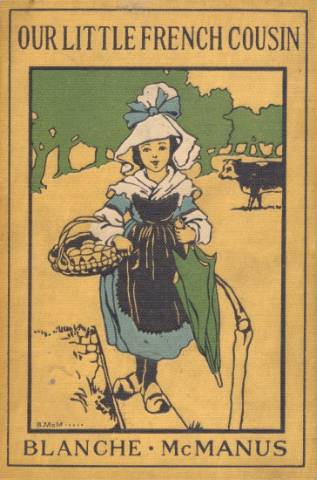Kellscraft Studio |
Kellscraft Studio |
Nekrassoff |
Web
Text-ures© |
Guide to |
Our Cats' |
|---|
Kellscraft Studio |
Kellscraft Studio |
Nekrassoff |
Web
Text-ures© |
Guide to |
Our Cats' |
|---|

Our Little French Cousin
By
Blanche McManus
Illustrated by
The Author
Boston
The Page Company
Publishers
Copyright, 1905
By L. C. PAGE & COMPANY
(INCORPORATED)
All
rights reserved
Published
May, 1905
Fourth Impression, May, 1908
Fifth Impression, October, 1909
Sixth Impression, June, 1911
Seventh Impression, February, 1913
Eighth Impression, October, 1915
Ninth Impression, March, 1918
Preface:
“OUR Little French
Cousin” is an attempt to tell, in plain, simple language, something of the
daily life of a little French girl, living in a Norman village, in one of the
most progressive and opulent sections of France.
The old divisions, or
ancient provinces, of France each had its special characteristics and manners
and customs, which to this day have endured to a remarkable extent.
To American children, no
less than to our English cousins, the memories of the great names of history
which have come down to us from ancient Norman times are very numerous.
Besides the great
Norman William who conquered England, and Richard the Lion-hearted, there are
the lesser lights, such as Champlain, La Salle, and Jean Denys, — the
discoverer of Newfoundland; and before them was the Northman ancestor of Rollo,
Lief, the son of Eric, who was perhaps the real discoverer of America. All
these link Normandy with the New World in a manner that is perhaps not at
first remembered.
“Our Little French
Cousin” lives in Normandy, simply because she must live somewhere, and not
because any attempt has been made to specialize or localize the every-day life
of Germaine, her parents, and her friends. Indeed, for a little French girl, it
may be thought that she had remarkable opportunities for acquaintanceship with
the outside world.
But to-day even little
French girls live in a progressive world, and what with tourists and
automobilists, to say nothing of a reasonably large colony of English-speaking
folk who had actually settled near her home, it was but natural that her outlook
was somewhat different from what it might have been had she lived a hundred
years ago.
So far as France in
general goes, the great world of Paris, and much that lay beyond, were also
brought to her notice in, it is believed, a perfectly rational and plausible
fashion; and thus within the restricted limits of this little book will be
found many references to the life and history of Old France which, in one way or
another, has linked itself with the early days in the history of America, in a
manner of which little American cousins are in no way ignorant.
Joliet, Champlain, La
Salle, Père Marquette, and many others first pointed the way and mapped out
the civilization of America, when it was but the home of the red man, now so
nearly disappeared.
Later came Lafayette
and Rochambeau, who were indeed good friends to the then new nation, and lastly,
if it is permissible to think of it in that light, the great Statue of Liberty,
in New York Harbour, is another witness of the friendliness of the French nation
for the people of the United States. A reciprocal echo of this is found in the
recent erection, in Paris, of a statue of Washington.
To her cousins across
the sea little Germaine, “Our Little French Cousin,” holds out a cordial
hand of greeting.
Les Andelys, Eure, January, 1905.